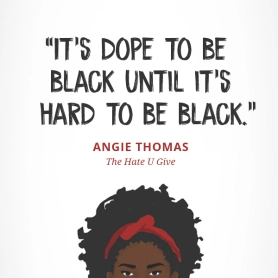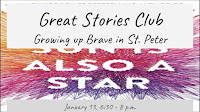Book #3 The Hate U Give
We met this week to talk about our third Great Stories Club book discussion in ALA’s Great Stories Club series, Growing up Brave on the Margins! We discussed the book The Hate U Give by Angie Thomas.
Icebreaker Challenge
We each tried to answer this question: Who are you today? using only six words. It's harder than you think! Inspiration came from this website: https://www.sixwordmemoirs.com/teens/Thomas’s novel asks: How can you create the space to be yourself wherever you go? What if your true identity is not accepted? How do you stand up for the rights of others? What does it mean to speak truth to power? How can you walk away from violent or hurtful situations with your dignity intact?
We reviewed our Group Agreements
Our group agreements help us to create a brave and honest space.
Questions and Themes we discussed for the this book
- Code-Switching
- speaking truth to power
- Race and Ethnicity with Social Justice
First we looked at a few different forms of racism using at this glossary.
THUG Life: In the opening chapter, Starr and Khalil talk about rap music and listen to influential ‘90s rapper, Tupac who (in)famously had the phrase T.H.U.G. (The Hate U Give) tattooed on his stomach.
One reader talked about how in the movie, it was really powerful to see Starr's little brother Sekani pick up the gun. It really reiterates the fact that this is a real problem, and Tupac's THUG LIFE: The Hate U Give Little Infants F* Everybody is true. Why do you think the author chose that phrase as the title of the novel? We talked about Tupac and watched this video (yes it's a powerade commercial. It uses Tupac's poem).
Code Switching: Throughout the novel Starr talks about how she has to be one person in her neighborhood and another Starr at school. Some have called this “code-switching." What is Code-Switching?
Code-switching occurs when a speaker alternates between two or more languages, or language varieties, in the context of a single conversation or between groups of people. Another example of this in the context of this book, is the way Starr talks with people in her neighborhood (she refers to it as "speaking ghetto") and how she speaks with her friends and teachers at her private school.

“Williamson Starr doesn't use slang - if a rapper would say it, she doesn't say it, even if her white friends do. Slang makes them cool. Slang makes her "hood". Williamson Starr holds her tongue when people piss her off so nobody will think she's the "angry black girl". Williamson Starr is approachable. No stank-eyes, none of that. Williamson Starr is not confrontational. Basically, Williamson Starr doesn't give anyone a reason to call her ghetto."
I am the rose/ this is the concrete/ these are my damaged petals. - Tupac Shakur
Code-switching occurs when a speaker alternates between two or more languages, or language varieties, in the context of a single conversation or between groups of people. Another example of this in the context of this book, is the way Starr talks with people in her neighborhood (she refers to it as "speaking ghetto") and how she speaks with her friends and teachers at her private school.
We talked about how people are sometimes gross at school and you know they're not talking that way with their parents. Once you see through the code switching (or both sides of it), it's hard to believe who that person really is. Is it possible to be both?
We agreed that it was a very "YAY!" moment when Starr finally snaps at her friends at school.
Starr has a complicated family situation. How does she define family? What about Starr's uncle? He had to navigate his life in Garden Heights and his transition to the suburbs as a police officer. He also has to deal with the backlash from both sides while trying to be true to himself.
What's up with Starr's friends Maya and Haley? Lots of low-key racism going on here (not intentional, not always malicious, but definitely some individual racism and microaggressions that finally make Starr take a step back and finally say something. More on Microaggressions in this video:
What do you think about Chris? How does the fact that they are in an interracial relationship complicate and/or strengthen their bond?
He's naive and a bit of an annoying character. What is she doing with him? Does he mean well? Does he redeem himself at any point during the story?
Community protests in the wake of unpopular legal verdicts are a big part of history. Starr’s neighborhood erupts into disbelief, frustration and rage after the grand jury’s decision for Khalil’s murder. How would St. Peter react to a grand jury decision like this? We like to think that St. Peter is a decent town and that people would be concerned and speak up about this. Would we really though? This is a large problem: many of us would likely go into survival mode and think: "I don't know this person, it doesn't effect me. I will mind my own business" Also, the emotional trauma that Starr experienced is awful. She has this to deal with internally, and then she has to talk about it?
Are the terms racism and sexism over-talked about? Yes, everything seems dramatic lately, but this is the time to talk about hard topics. Also, Starr was often underestimated as a young person. The group feels that young people in general are underestimated and NOW is the time for things to change.
Why the change? Miscommunication with Media Biases may be partly to blame. It all becomes a twisted story like a twisted game of telephone. Social Media makes this worse. What really happened?
We have a hard time imagining Garden Heights as a neighborhood in St. Peter. But at the same time, it's a realistic view of this world. The group feels this would be a better book to teach in 8th grade English class instead of the Outsiders. The people in Starr's neighborhood are real people and are part of the community, not just extras who are just gang members. In this book they are gang members who also love their family. Here's a map from the e-book:
Other random thoughts from our meeting:
The walk out at Starr's school reminded the group of the walk out at the St. Peter Middle School for "school safety" Many were just happy to get out of class when others were generally concerned and wanted to make a difference.
If you could live in any decade, what would it be? (Vikings / Japanese B.C?)
If you could change any event in history, what would it be? (Columbus Ship Sinks?)
Book Recommendations:
Paige recommends People Kill People by Ellen Hopkins
Vera recommends American Street by Ibi Zoboi
Check out Angie Thomas's second book: On the Come Up (Brenda recommends the audio version of this book, as the raps are performed by the reader."
Next up:
All School Assembly at St. Peter High, Feb. 3, at 9:30 a.m.
Shadowshaper, March 2, 6:30 p.m.






Comments
Post a Comment